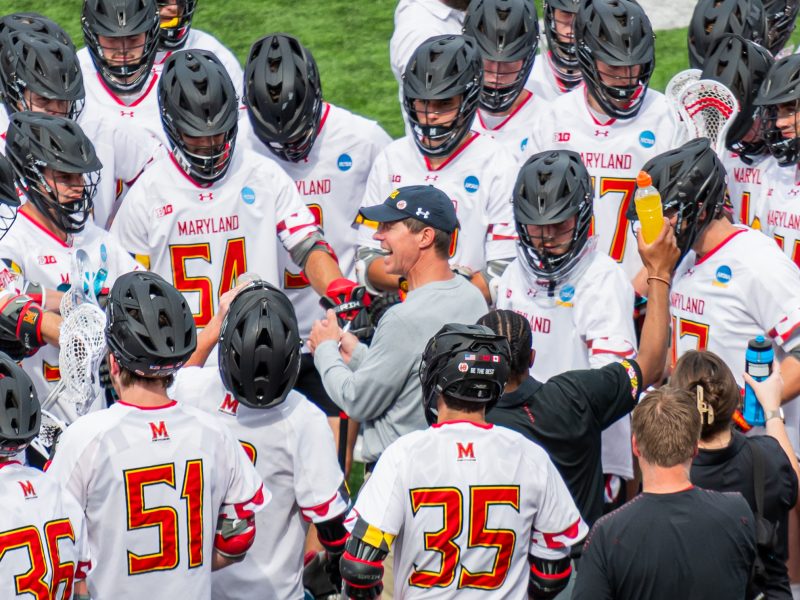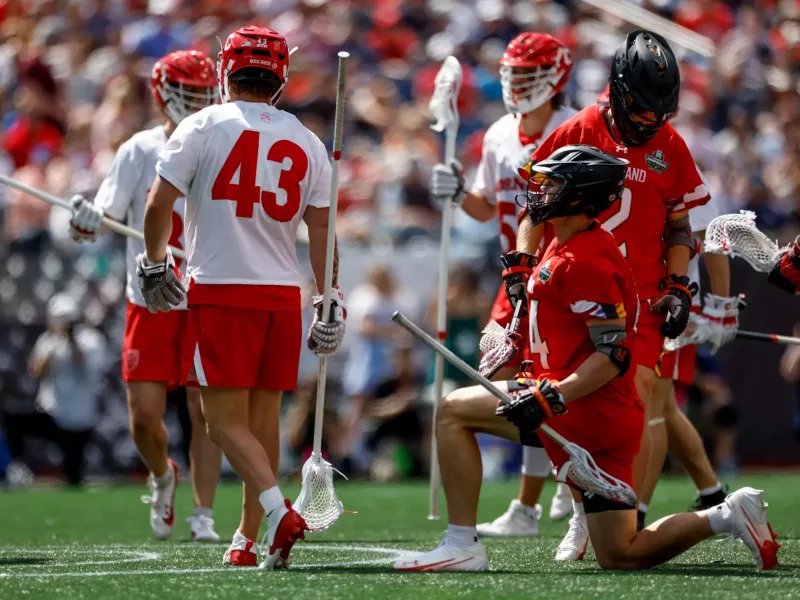It was 1996, and Richie Meade needed to hire an assistant. So the then-Navy coach reached out to coaches at other Division I schools for suggestions.
One name came up in every conversation: John Tillman, an assistant coach at Ithaca who bartended on the side to make ends meet.
The interview went well, and Tillman filled the hole in Meade’s staff. He became a fixture on the Navy sideline for the next 12 seasons.
Twenty years and two head coaching jobs removed from his arrival in Annapolis, Tillman is in his sixth season at the helm of the Maryland men’s lacrosse team. He’ll have the chance to face the program that built the foundation of his coaching career when the No. 5 Terps welcome No. 7 Navy into Maryland Stadium on Tuesday night after poor weather postponed the season-opening matchup originally scheduled for Feb. 13.
“He went through the whole gamut in 12 years from kind of being the young guy,” Meade, now the coach at Furman, said in an interview before the season. “Once he had his chance, he made quite a name for himself.”
Meade originally hired Tillman to be a five-year second assistant, a position that required he work in the academy’s physical education department, too.
But once that stint was over, Meade knew he couldn’t let Tillman leave. So Meade promoted him to head assistant coach, and Tillman guided the Midshipmen offense to become one of the top units in the NCAA.
Tillman orchestrated the attack that scored a program-record 221 goals en route to the Midshipmen’s national championship appearance in 2004.
Plus, he led the Midshipmen’s recruiting efforts, using what Meade said was his infectious personality and calm demeanor to lure players to Annapolis. Meade credited the talent Tillman collected as one of the reasons Navy beat Army in nine of Tillman’s 12 years at the academy.
Along the way, Tillman’s success with the Midshipmen resulted in interest from Division I programs looking for head coaches. The Cornell graduate turned them down, though.
“He wasn’t going to go under any circumstances unless they were the circumstances where he felt he could be as successful as he wanted to be,” Meade said.
But when Harvard came calling in 2008, Meade took matters into his own hands.
“‘Listen, Bob, he talks like the coach at Harvard,” Meade recalled telling Harvard Athletic Director Bob Scalise. “He acts like the coach at Harvard. He looks like the coach at Harvard.'”
He told Tillman the same thing.
So Tillman left the Midshipmen and took the reins of the Crimson. By his third season in 2010, Harvard was ranked as high as No. 11.
Shortly after that season, Tillman became the leader of the Terps. In his first five years, the Terps have made four Final Four appearances, advancing to and losing in three national championships.
Midway through his sixth campaign, he’s compiled a 72-25 record, including a 5-0 mark against Navy, and Tillman faced off against Meade in 2011. Meade has a theory for Tillman’s success.
“When you’re playing against the Naval Academy, you’re playing against the entire academy,” Meade said. “Understanding the academy and what the kids lives are like at the academy and what it takes to be a lacrosse player there gives you a window into their soul.”
Tillman isn’t taking Tuesday’s contest lightly, though.
The Midshipmen have won seven consecutive games, including an overtime victory against No. 20 Army on Saturday. The Terps, meanwhile, are winners of eight straight.
Tillman worried before the original February tilt his team would be rusty. Eleven games into the season, Tillman is now preaching for solid transition defense and a fast-paced attack — which he felt the Terps lacked in Saturday’s win over Rutgers — to break Navy’s third-ranked scoring defense.
“They’re just so solid everywhere,” Tillman said. “This is a pretty good measuring stick to where we are.”
Tillman doesn’t often share stories with his players about his time at Navy. Neither does assistant coach J.L. Reppert, who played for the Midshipmen and Tillman from 1996-1999 and was an assistant at the academy later on.
Even so, the Terps are eager to continue their success against the program that provided a springboard for their coach’s Division I coaching career.
“They don’t want to take focus [on] themselves and their past careers, but we all understand what it is,” defender Matt Dunn said. “That definitely gives an extra incentive to us.”



